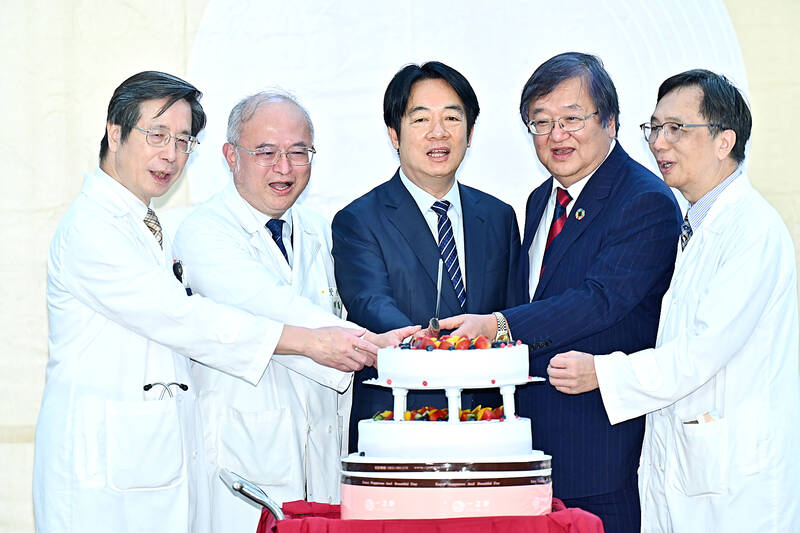As the government continues to advance cancer prevention and treatment policies, President William Lai (賴清德) yesterday expressed hope that National Taiwan University Hospital (NTUH) would continue to be a key partner in achieving the goal of a “healthy Taiwan,” while attending NTUH’s 130th anniversary celebration.
Lai thanked the hospital for its longstanding contributions to the nation.
He praised NTUH as a guardian of public health — both in ordinary times and during the COVID-19 pandemic — and commended its leadership in medical education and research, which has propelled the advancement of Taiwan’s healthcare system.

Photo: Tu Chien-jung, Taipei Times
As a medically trained professional, Lai said he hopes to strengthen collaboration between the healthcare sector and other fields to build a “healthy Taiwan.”
While average life expectancy in Taiwan has risen, there is concern that the number of years lived with disability or illness has also increased, he said.
The government aims to raise the average life expectancy from 79 to 82 years and reduce the proportion of life lived with disability or disease from 10 percent to 8 percent, he added.
To meet this goal, the government has launched a range of initiatives, with cancer prevention and treatment identified as the top priority, he said.
Cancer has remained the leading cause of death in Taiwan since 1982, he said, adding that eligibility for government-funded cancer screening has been expanded, the number of screening tests has increased, and the budget has been significantly increased from NT$2.8 billion to NT$6.8 billion (US$95 million to US$230.4 million).
Lai said that he has visited NTUH’s Cancer Center and is grateful for the hospital’s contributions to cancer treatment, research and education.
He also said the public has high hopes for NTUH to continue playing a vital role in improving cancer outcomes in Taiwan.
NTUH superintendent Wu Ming-shiang (吳明賢) said the hospital and other healthcare facilities have been playing the role of the “hidden sacred mountain protecting the nation,” taking care of the public’s health.
The NTUH and NTU College of Medicine have together educated and trained many outstanding talents in the field, whose contributions have brought remarkable achievements in Taiwan’s knowledge creation and healthcare services, he said.
Medicine is a science of uncertainty,” Wu said, adding that while there is still significant room for improvement in treating many illnesses, new methods would continue to emerge as technology advances.
NTUH cannot rest on its current achievements and must continue to train excellent talent to support the healthcare system, which is the hospital’s core value.
Regarding artificial intelligence, Lai said that it might serve as a valuable tool for medical professionals, but can never replace human beings, as medical ethics require doctors to make critical decisions, and machines cannot provide the warmth and support for people when they need it the most.
Minister of Health and Welfare Chiu Tai-yuan (邱泰源), NTU vice president Chang Shan-chwen (張上淳) and NTUH deputy superintendent Ni Yen-hsuan (倪衍玄) also attended the event.

The manufacture of the remaining 28 M1A2T Abrams tanks Taiwan purchased from the US has recently been completed, and they are expected to be delivered within the next one to two months, a source said yesterday. The Ministry of National Defense is arranging cargo ships to transport the tanks to Taiwan as soon as possible, said the source, who is familiar with the matter. The estimated arrival time ranges from late this month to early next month, the source said. The 28 Abrams tanks make up the third and final batch of a total of 108 tanks, valued at about NT$40.5 billion

Two Taiwanese prosecutors were questioned by Chinese security personnel at their hotel during a trip to China’s Henan Province this month, the Mainland Affairs Council (MAC) said yesterday. The officers had personal information on the prosecutors, including “when they were assigned to their posts, their work locations and job titles,” MAC Deputy Minister and spokesman Liang Wen-chieh (梁文傑) said. On top of asking about their agencies and positions, the officers also questioned the prosecutors about the Cross-Strait Joint Crime-Fighting and Judicial Mutual Assistance Agreement, a pact that serves as the framework for Taiwan-China cooperation on combating crime and providing judicial assistance, Liang

A group from the Taiwanese Designers in Australia association yesterday represented Taiwan at the Midsumma Pride March in Melbourne. The march, held in the St. Kilda suburb, is the city’s largest LGBTQIA+ parade and the flagship event of the annual Midsumma Festival. It attracted more than 45,000 spectators who supported the 400 groups and 10,000 marchers that participated this year, the association said. Taiwanese Designers said they organized a team to march for Taiwan this year, joining politicians, government agencies, professionals and community organizations in showing support for LGBTQIA+ people and diverse communities. As the first country in Asia to legalize same-sex

MOTIVES QUESTIONED The PLA considers Xi’s policies toward Taiwan to be driven by personal considerations rather than military assessment, the Epoch Times reports Chinese President Xi Jinping’s (習近平) latest purge of the Chinese People’s Liberation Army (PLA) leadership might have been prompted by the military’s opposition to plans of invading Taiwan, the Epoch Times said. The Chinese military opposes waging war against Taiwan by a large consensus, putting it at odds with Xi’s vision, the Falun Gong-affiliated daily said in a report on Thursday, citing anonymous sources with insight into the PLA’s inner workings. The opposition is not the opinion of a few generals, but a widely shared view among the PLA cadre, the Epoch Times cited them as saying. “Chinese forces know full well that